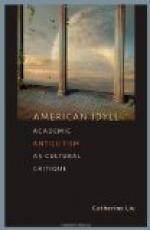The next college occasion was a rally at the Greek Theatre. Again it was announced at the table that all the unescorted ones would accompany Carl and me. I foresaw trouble. When I came downstairs later, with my hat and coat on, there stood Carl, surrounded by about six girls, all hastily buttoning their gloves, his sister, who knew no more of the truth about Carl and me than the others, being one of them. Never had I seen such a look on Carl’s face, and I never did again. His feet were spread apart, his jaw was set, and he was glaring. When he saw me he said, “Come on!” and we dashed for the door.
Sister Helen flew after us. “But Carl—the other girls!”
Carl stuck his head around the corner of the front door, called defiantly, “Damn the other girls!” banged the door to, and we fled. Never again were we molested.
Carl finished his Senior year, and a full year it was for him. He was editor of the “Pelican,” the University funny paper, and of the “University of California Magazine,” the most serious publication on the campus outside the technical journals; he made every “honor” organization there was to make (except the Phi Beta Kappa); he and a fellow student wrote the successful Senior Extravaganza; he was a reader in economics, and graduated with honors. And he saw me every single day.
I feel like digressing here a moment, to assail that old principle—which my father, along with countless others, held so strongly—that a fellow who is really worth while ought to know by his Junior year in college just what his life-work is to be. A few with an early developed special aptitude do, but very few. Carl entered college in August, 1896, in Engineering; but after a term found that it had no further appeal for him. “But a fellow ought to stick to a thing, whether he likes it or not!” If one must be dogmatic, then I say, “A fellow should never work at anything he does not like.” One of the things in our case which brought such constant criticism from relatives and friends was that we changed around so much. Thank God we did! It took Carl Parker until he was over thirty before he found just the work he loved the most and in which his soul was content—university work. And he was thirty-seven before he found just the phase of economic study that fired him to his full enthusiasm—his loved field of the application of psychology to economics. And some one would have had him stick to engineering because he started in engineering!
He hurt his knee broad-jumping in his Freshman year at college, and finally had to leave, going to Phoenix, Arizona, and then back to the Parker ranch at Vacaville for the better part of a year. The family was away during that time, and Carl ran the place alone. He returned to college in August, 1898, this time taking up mining. After a year’s study in mining he wanted the practical side. In the summer of 1899 he worked underground in the Hidden Treasure Mine, Placer county, California. In 1900 he left college again, going to the gold and copper mines of Rossland, British Columbia. From August, 1900, to May, 1901, he worked in four different mines. It was with considerable feeling of pride that he always added, “I got to be machine man before I quit.”




